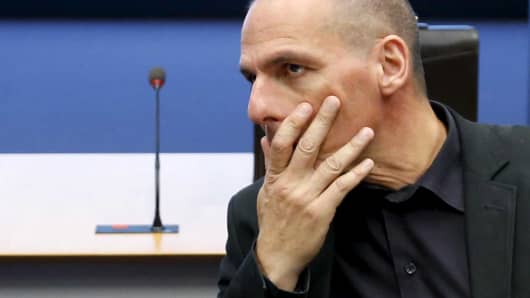
The European Central Bank told a meeting of euro zone finance ministers on Thursday that it was not sure if Greek banks, which have been suffering large daily deposit outflows, would be able to open on Monday, Reuters reported.
Officials with knowledge of the discussions, which took place at a closed-door meeting of the euro zone finance ministers and the European Central Bank and International Monetary Fund, told Reuters the deposit outflow was the only thing mentioned by ECB President Mario Draghi during his intervention.
Two officials told Reuters that during the meeting, Eurogroup chairman Jeroen Dijsselbloem asked ECB Executive Board member Benoit Coeure if Greek banks would be able to open tomorrow.
Read MoreEurogroup talks end with no deal on Greece
According to Reuters’ sources, Coeure answered: “Tomorrow, yes. Monday, I don’t know”
The Financial Times Brussels bureau chief wrote on Twitter that the ECB denied the report on Coeire’s comment. Later, the same journalist tweeted that he had confirmed the Reuters report with two senior officials who attended the meeting.
That comment was not audible during the main public meeting, a source who attended that event told CNBC—but that does not mean Coeure’s statement could not have occurred in a sideline discussion.
The ECB governing council is planning to hold a telephone conference on Friday about extending emergency liquidity to Greek banks, sources told Reuters.
Greek savers have withdrawn about 2 billion euros from banks over the past three days, with outflows accelerating rapidly since talks between the government and its creditors collapsed at the weekend, banking sources told Reuters.
The 2 billion euros taken out between Monday and Wednesday represent about 1.5 percent of total household and corporate deposits of 133.6 billion euros held by Greek banks as of end-April. Prior to this week, withdrawals had been running at 200-300 million euros a day.
Dijsselbloem, asked at a news conference after the meeting about the pace of deposit outflows in Greece, said:
“I cannot confirm those figures, but it is certainly worrying. If people are taking their money out of the banks, they are very worried about what the future might bring.
“It is strongly in the interest of the Greek people to reach an agreement. The responsibility for that lies with the Greek government. They have been put in office with a great responsibility, to look out for the future of their people, and the outflow of the deposits from the banks is a sign of great concern about that future,” he said.
Euro zone leaders will hold an emergency summit on Monday to try to avert a Greek default after bank withdrawals accelerated and government revenue slumped as Athens and its international creditors remain deadlocked over a debt deal.
Finance ministers of the 19-nation currency bloc failed to make any breakthrough on a cash-for-reforms agreement at talks in Luxembourg on Thursday, just 12 days before Greece must make a crucial debt repayment to the International Monetary Fund.
Meanwhile, Greek Finance Minister Yanis Varoufakis said on Thursday the euro zone was “dangerously close” to a state of mind “that accepts an accident,” slamming other ministers, whom he said did not want to discuss his proposal to set up an automatic break on the country’s public deficit.
Varoufakis said the “radical proposal” for an independent fiscal council monitoring budget execution, with an automated hard deficit break, was Greece’s “gesture of goodwill to our partners,” to show it is keen to reform.
[“source-cnbc.com”]
